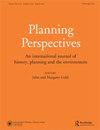Merlin Chowkwanyun,所有健康政治都是地方性的
IF 0.9
3区 历史学
0 ARCHITECTURE
引用次数: 0
摘要
《所有健康政治都是地方性的》(All Health Politics is Local)从大胆的封面上就宣称了自己的论点,但梅林·乔克万云(Merlin Chowkwanyun)明智而及时的框架使这一历史学术值得远远超出卫生政策领域的人们深入阅读。历史学家Chowkwanyun在《社会医学研究》系列文章中认为,美国人的健康不仅受到广泛的联邦卫生政策的影响,而且受到广泛的地方影响,包括“政治机器、社区组织、种族政治、城市发展、基层政治动员、拨款和政府支出的流动”,锚定制度、政治经济转变以及外生和意外事件”(第4-5页)。通过精心构建的案例研究,涵盖了世纪中期纽约、洛杉矶、克利夫兰和阿巴拉契亚中部的医疗保健和环境健康,他确定了联邦趋势如何留下“不同的健康印记,取决于你所在的国家”(第13页)。Chowkwanyun轻松地将大量公共和私人收藏的档案研究融入了最近的跨学科对话中,写作新鲜、生动、令人愉快。案例研究分为六章,强调了保护和改善健康的地方行动的价值和经常被忽视的地方行动;但他们也在与当地行动的局限性作斗争。地方主义和地方政治有局限性吗?地方行动能否克服、抵消或提出替代国家和全球趋势的可行方案?最终,Chowkwanyun呼吁多尺度的健康政治——这是标题中的一个星号。所有的卫生政治都是地方性的,但它与“反复出现的经济动荡、寄生的国家能源基础设施和卫生领域不可预见的新利益相关者的更大平行流共存”(第234页)。虽然《所有健康政治都是地方性的》是一篇历史分析,但这个话题及其教训与我们所处的时代有着惊人的相关性。Chowkwanyun将案例研究的地点追溯到20世纪80年代,但他的结论将我们带到了2022年。他列举了最近的例子,说明地方解决医疗保健不公平和环境健康问题的努力如何因引入风险投资和跨国企业集团而受挫,以及地方环境保护斗争如何因无限制的气候变化而被冲走。这些最近的例子有助于将案例研究置于当代挑战的背景中;但即使没有它们,我们也很难忽视这些案例与今天的关系。撇开气候灾难和风险投资不谈,Chowkwanyun从肯塔基州健康活动家Eula Hall的日常行程中挖掘的文件,到洛杉矶县监事会的公民信件和会议记录,以及下东区社区卫生委员会的私人海报收藏,都展示了贫困、暴力和种族主义警察的作用,以及破坏健康的资源和服务分配不均。鉴于最近在这一领域获得的学术成果,包括警察暴力、早产和妊娠损失增加、种族主义对健康的影响、气候变化使环境正义面临的持续挑战、本文章由计算机程序翻译,如有差异,请以英文原文为准。
Merlin Chowkwanyun, All Health Politics is Local
All Health Politics is Local proclaims its argument right from the bold cover, but Merlin Chowkwanyun’s judicious and timely framing makes this historical scholarship well worth a deep read by folks far beyond the health policy field. Writing as part of the Studies in Social Medicine series, historian Chowkwanyun argues that Americans’ health was (and is) shaped not only by expansive federal health policies but also by a broad array of local influences, including ‘political machines, neighborhood organizations, racial politics, urban development, grassroots political mobilization, the flow of grants and government outlays, anchor institutions, political economic shifts, and exogenous and unexpected events’ (p. 4-5). Through carefully constructed case studies covering healthcare and environmental health in midcentury New York, Los Angeles, Cleveland, and Central Appalachia, he establishes how federal trends left ‘different health imprints depending on where in the country you sat’ (p. 13). Chowkwanyun comfortably weaves archival research from numerous public and private collections into recent interdisciplinary conversations with writing that is fresh, lively, and enjoyable to read. The case studies, spread out across six chapters, highlight the worthy and often overlooked on-theground local actions to protect and improve health; but they also wrestle with the limits of local action. Are there limits to localism and local politics? Can local action overcome, counteract, or mount viable alternatives to national and global trends? Ultimately, Chowkwanyun calls for multi-scalar health politics – an asterisk to the title’s claims. All health politics is local, but it coexists with ‘larger parallel currents (of) recurrent economic turbulence, parasitic national energy infrastructure, and unforeseen new stakeholders in the health arena’ (p. 234). While All Health Politics is Local is a historical analysis, the topic and its lessons are stunningly relevant for the time in which we live. Chowkwanyun traces the case study locations through the 1980s, but his conclusion brings us right to 2022. He draws in recent examples of how local efforts to address health care inequities and environmental health are trounced by the introduction of venture capital and multinational conglomerates, and how local fights for environmental protection are swept away by the enormity of unconfined climate change. These recent examples are helpful in contextualize the case studies within contemporary challenges; but even without them, it’s hard to miss just how pertinent these cases are to today. Climate catastrophe and venture capital aside, Chowkwanyun’s excavation of documents from the daily itinerary of Kentucky health activist Eula Hall, to citizen letters and meeting transcripts of the LA County Board of Supervisors, and the private collection of posters from Lower East Side Neighborhood Health Council all demonstrate the roles of poverty, violent and racist policing, and the maldistribution of resources and services in destroying health. Given recent scholarship in this area – on the topics of police violence and increased preterm birth and pregnancy loss, the effects of racism on health, ongoing environmental justice challenges made worse by climate change, rising
求助全文
通过发布文献求助,成功后即可免费获取论文全文。
去求助
来源期刊

Planning Perspectives
Multiple-
CiteScore
1.50
自引率
12.50%
发文量
85
期刊介绍:
Planning Perspectives is a peer-reviewed international journal of history, planning and the environment, publishing historical and prospective articles on many aspects of plan making and implementation. Subjects covered link the interest of those working in economic, social and political history, historical geography and historical sociology with those in the applied fields of public health, housing construction, architecture and town planning. The Journal has a substantial book review section, covering UK, North American and European literature.
 求助内容:
求助内容: 应助结果提醒方式:
应助结果提醒方式:


